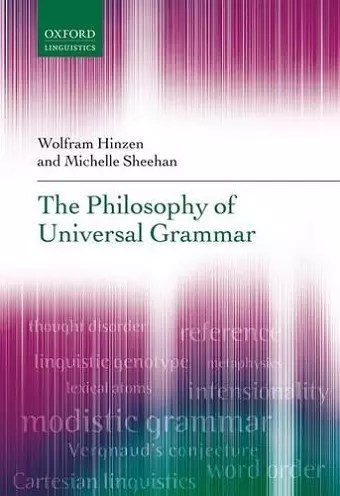The Philosophy of Universal Grammar
Michelle Sheehan author Wolfram Hinzen author
Format:Hardback
Publisher:Oxford University Press
Published:14th Nov '13
Currently unavailable, and unfortunately no date known when it will be back
This hardback is available in another edition too:
- Paperback£39.49(9780198736684)

What is grammar? Why does it exist? What difference, if any, does it make to the organization of meaning? This book seeks to give principled answers to these questions. Its topic is 'universal' grammar, in the sense that grammar is universal to human populations. But while modern generative grammar stands in the tradition of 'Cartesian linguistics' as emerging in the 17th century, this book re-addresses the question of the grammatical in a broader historical frame, taking inspiration from Modistic and Ancient Indian philosopher-linguists to formulate a different and 'Un-Cartesian' programme in linguistic theory. Its core claim is that the organization of the grammar is not distinct from the organization of human thought. This sapiens-specific mode of thought is uniquely propositional: grammar, therefore, organizes propositional forms of reference and makes knowledge possible. Such a claim has explanatory power as well: the grammaticalization of the hominin brain is critical to the emergence of our mind and our speciation. A thoroughly interdisciplinary endeavour, the book seeks to systematically integrate the philosophy of language and linguistic theory. It casts a fresh look at core issues that any philosophy of (universal) grammar will need to address, such as the distinction between lexical and grammatical meaning, the significance of part of speech distinctions, the grammar of reference and deixis, the relation between language and reality, and the dimensions of cross-linguistic and bio-linguistic variation.
A radical vision that challenges standard conceptions that human language is a mere conduit for thought, that there is a Language of Thought, and that Grammar and Semantics are separable. Hinzen and Sheehan ground their Un-Cartesian approach in ancient linguistic traditions in India and in the work of the Modistae, for whom grammar was central to an understanding of minds, and reality. Upturning major assumptions of modern Linguistics and Philosophy of Language, this enthralling book is a central one for Cognitive Science * Jill De Villiers, Professor of Psychology and Philosophy, Smith College *
An essential reference for anyone trying to grapple with the mysterious underpinnings of that most essential of human qualities, language * Ian Tattersall, Curator Emeritus, American Museum of Natural History *
This book asks some of the most fundamental questions that there can be about language and mind, and answers them in ways which are provocative, challenging, and surprising, in the context of current theorizing within philosophy and linguistics. The theory is supported by a wealth of conceptual and empirical arguments with detailed discussion of consequences for central grammatical notions such as case, person, word order, phases, and semantic notions such as reference, predication, and truth. This must be one of the most important books about language and thought in a very long time. * Anders Holmberg, Professor of Theoretical Linguistics, Newcastle University *
ISBN: 9780199654833
Dimensions: 241mm x 161mm x 27mm
Weight: 748g
396 pages